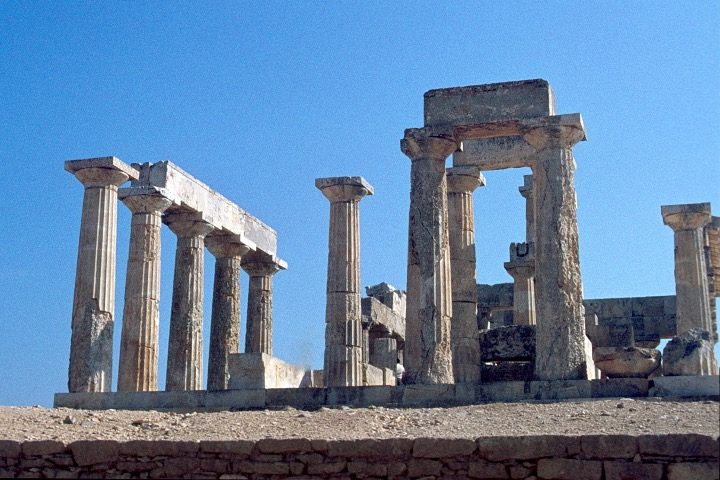
Westerners used to believe they were heirs to the greatest civilization to ever grace God’s green Earth. They then descended into a culturally relativistic mentality stating, “Who’s to say one civilization is better than another?” The next transition was a cynical, “Meh, we’re not so hot.” Then there was the full-bore hatred of Marxist and other left-wing revisionists who claimed the West was exploitative and inspired sentiments such as the ’80s chant, “Hey hey, ho ho, Western Civ has got to go.” But now, under an Oxford professor’s theory, it doesn’t have to go.
Because it doesn’t exist in the first place.
Interesting here is that the Left’s “transgender” activists, when addressing the truth that “trans” people don’t exist (because you can’t actually change sexes), have claimed that denying their existence is to commit “genocide” against the community. It is in this sense that Josephine Quinn, professor of ancient history at Oxford University, advocates “genocide” against the West via her new book How the World Made the West.
For the work’s aim is, informs writer S.R. Piccoli,
to bring to fulfillment the goal and the dream of legions of leftists the world over and from time immemorial. Quinn’s purpose is not to trash what generations of schoolchildren and college students have been taught to take pride in as Western values and achievements. Rather, she wants to demolish the underlying concept of what she calls “civilizational thinking,” which suggests that there is no such thing as “Western civilization.” By the way, as she puts it, this “civilizational thinking” provided the cultural rationale for western European supremacy during the 19th century, enabling colonial expansion and racial hierarchies.
Quinn points out that Western civilization would not exist without its Islamic, African, Indian, and Chinese influences, and that so-called Western values — freedom, rationality, justice and tolerance — are not only or originally Western. Rather, “the West itself is in large part a product of long-standing links with a much larger network of societies.”
In other words, “You didn’t build that. Somebody else made that happen,” as Barack Obama put it years ago.
Now, if Quinn simply meant, as the great Thomas Sowell observed in 1998, “No great civilization has developed in isolation,” that would be one thing. For this is undoubtedly true.
“For example,” Sowell explained, “when the British first crossed the Atlantic and confronted the Iroquois on the eastern seaboard of what is today the United States, they were able to steer across that ocean in the first place because they used rudders invented in China, they could navigate on the open seas with the help of trigonometry invented in Egypt, their calculations were done with numbers invented in India, and their general knowledge was preserved in letters invented by the Romans.”
This is the old “Two heads are better than one” phenomenon, and that this is a prerequisite for great civilization is not news. For instance, as China started to retreat into a shell many centuries ago, it began falling behind technologically.
The trouble with Quinn, however, “is that if there are no monolithic ‘civilizations,’ she seems to deny even that there are (at least) distinct cultures,” writes Piccoli. “This is, quite frankly, the same as thinking a square has five sides, a challenge to common sense and to the most evidence-based certainties.”
Even more to the point, assuming Piccoli’s characterization of Quinn’s thesis is correct, how is this much different from Obama’s sentiment?
Obama was talking about individuals, about people who open businesses, when he said “you didn’t build that.” Just consider Quinn herself in this light. Do we give her credit for her intellectual accomplishments? Can we even identify her as a distinct “intellectual”? After all, how much of what she knows is original?
Her parents taught her the English language, which they themselves didn’t originate. She had to be taught how to write. She was educated in schools. And unless she discovered original manuscripts (which would’ve been created by others) or made unique archaeological discoveries, the facts in her book were derived from earlier historians. She stands on the shoulders of others. So, again, how does she, as an intellectual, even exist?
Putting aside Quinn’s claims’ historicity (which will, eventually, be exhaustively analyzed), a question suggests itself about her thesis:
So what?
First, if “knowledge” — which, admittedly, is extremely important — guaranteed accomplishment, the world wouldn’t be full of “overqualified” people and stuffy academics who never do anything of substance. Success is determined by a confluence of multiple factors, some of which, especially when civilizations are at issue, are perhaps poorly understood.
For example, much of civilizational success has been chalked up (by Sowell, for instance) to geographic realities that either facilitate trade, and thus an exchange of ideas, or that isolate people. But what of “human capital”? What of Christianity’s influence? What of revelation? What of perhaps intangible factors?
The truth is that a civilization can be exposed to a wealth of “data,” of information, but it still has to sift the facts from the fiction and amalgamate them into something better — something, ideally, the world hasn’t seen before.
Analogizing it to individuals again, do we not give Orville and Wilbur Wright credit for inventing the first heavier-than-air flying craft because the materials and propulsion system they used reflected others’ technology? Do we scoff at praise for a chef who originates a delectable new dish because the spices he used were others’ handiwork?
The reality: As I illustrated in 2023’s “A World Without the West,” such a place would be a dark realm, indeed. Sure, given enough time, perhaps some other civilization could have delivered the West’s glories, eventually. But no other civilization did.
The West did that — end of story.



